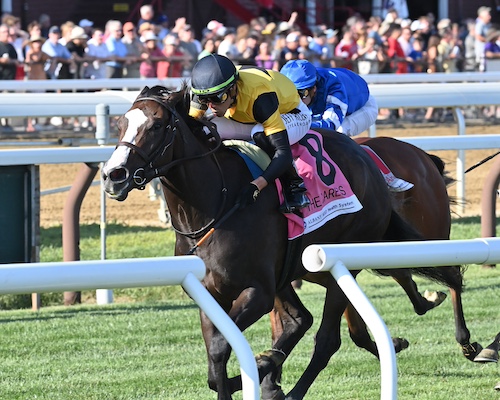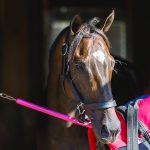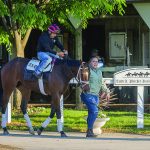The Iroquois Steeplechase, the richest spring meeting on the American jump-racing calendar, teams up with England’s Cheltenham Racecourse, home of the world famous Cheltenham Festival, on a $500,000 bonus next year.
The prize will go to the first horse horse that can win the Grade 1 Ladbrokes World Hurdle and the Iroquois within the space of 12 months, giving a chance for the 2016 Iroquois winner to try for the bonus in the 2017 World Hurdle. Both races are contested at 3 miles, with the World Hurdle slated for March 17 and the Iroquois set for May 14.
The Brown Advisory Iroquois Cheltenham Challenge is seen as a great way of reigniting the cross-Atlantic rivalry that was so exciting for jump racing in the 1970s and 1980s.
To facilitate this new concept, investment manager Brown Advisory, based in U.S. and the U.K., has agreed to sponsor the bonus which would reward the winner a total of more than $850,000 in prize money (the winner’s shares of the race purses and the bonus). The World Hurdle carries a £300,000 total purse while the Iroquois is worth $150,000.
Brown Advisory already has a presence at The Festival with partners Merriebelle Stable as sponsors the Brown Advisory & Merriebelle Stable Plate, a handicap chase staged over 2 5/8 miles which takes place at The Festival on St Patrick’s Thursday after the Ladbrokes World Hurdle.
Robert Waley Cohen, chairman of Cheltenham Racecourse, commented: “I am hugely excited that Cheltenham Racecourse, along with our friends at Brown Advisory, is to partner with the Iroquois Steeplechase to offer this valuable bonus for long distance hurdlers.
“I remember well the heydays of America owners and racehorses in the U.K. 25 years ago and hopefully this tremendous initiative will provide some new and interesting stories as the links between British and America Jump racing are reignited.”
Iroquois Steeplechase Chairman Dwight Hall, a former jockey and board member of the National Steeplechase Association, said: “Throughout modern history, a number of great horses have crossed the Atlantic to race and we want to promote that international competition.”
Mike Hankin, president and CEO of Brown Advisory, added: “We are excited to support races on both sides of the Atlantic to unite and encourage competition between American and British Jump racing.”
Willie Mullins, the most successful Irish trainer ever at The Festival, remarked: “I am delighted to hear about this $500,000 bonus. It is good to see two racecourses getting together like this. We need to embrace international competition for the sport of jump racing to grow. I will support the Brown Advisory Iroquois Cheltenham Challenge as much as possible and hope it will encourage similar international initiatives.”
A strong link between British and American Racing
The Sport Of Kings Challenge – which carried a $1 million bonus system for novice hurdle horses – linked Cheltenham and U.S. jump racing in the 1990s with numerous horses making the trips (in both directions) to compete internationally.
In addition, Toby Balding sent over Morley Street to capture two Breeders’ Cup Steeplechases (1990 and 1991), while New Zealand-bred Grand Canyon proved a top-grade hurdler both in the United Kingdom and the United States in the 1970s. In 1990, the Paddy Mullins-trained Grabel made the trip to lift the $750,000 hurdle race (the richest jump race ever held in the U.S.) at what is now Kentucky Downs, not far from Nashville.
American Raymond Guest brought L’Escargot and others to the U.S. to compete, while more recently Irish trainer Gordon Elliott brought William Salthouse’s Eshtiaal to finish second in the $300,000 Grade 1 Grand National at Far Hills, N.J. Oct. 17.
Conversely, four-time American champion Flatterer finished second to the great See You Then in the 1987 Champion Hurdle at Cheltenham. As part of the Sport of Kings Challenge, five-time U.S. champion Lonesome Glory won a novice hurdle at Cheltenham in 1992.
Numerous other American chasers also have run well in big British races in the ’60s, ’70s and ’80s, winning at Aintree, Cheltenham, Sandown, and Newbury. The memories of Jay Trump, Inkslinger, Soothsayer, Fort Devon, Tingle Creek, Ben Nevis, and Uncle Merlin bring to mind the international competitive spirit.
The Iroquois has a history of international flavor with New Zealand’s Rand winning in 2001 en route to a career in England and numerous American-based Englisn and Irish imports winning the historic race, which was first run in 1941. Among those names are All Gong Pierrot Lunaire, Arcadius, Demonstrative, All Gong, Correggio and Kesslin.
The Iroquois is named for a horse that was the first American-bred colt to win the English Derby in 1881, before retiring to stud at General William Harding’s Belle Meade Plantation in Nashville.








